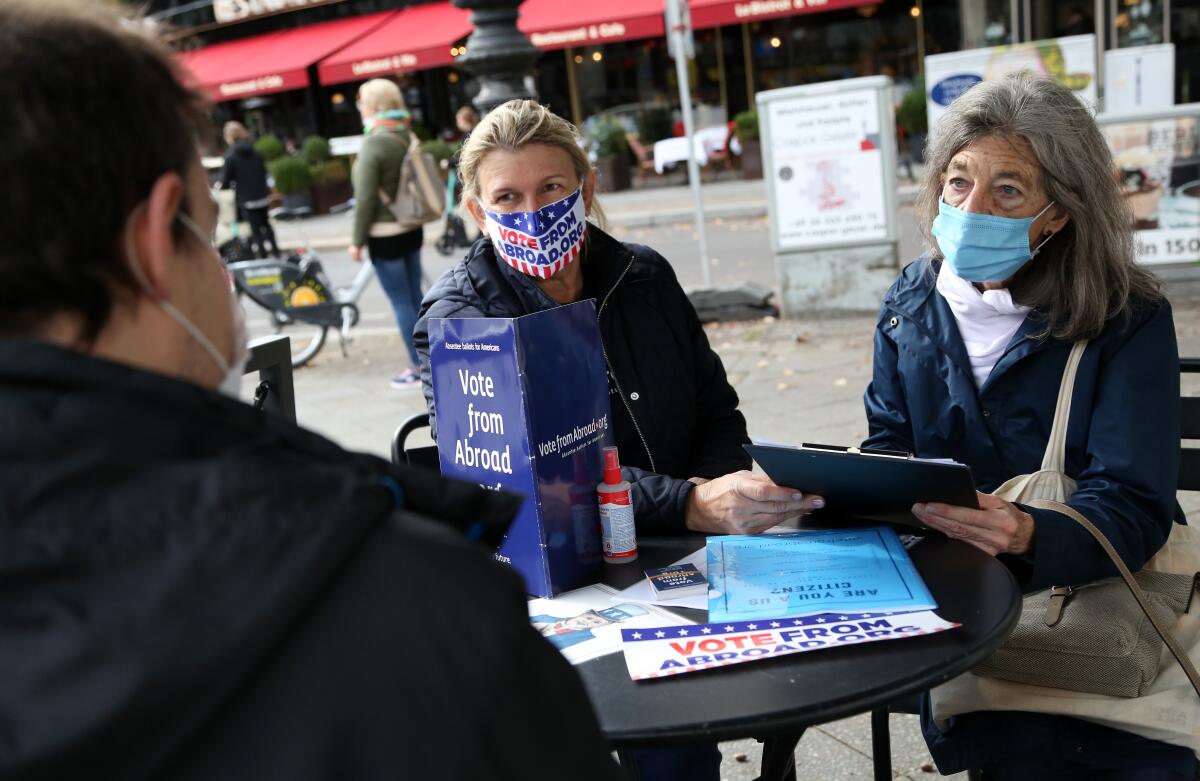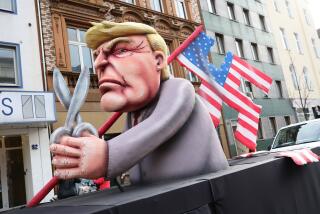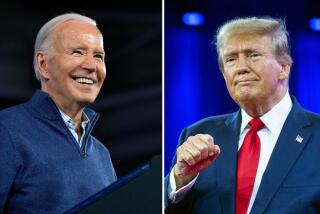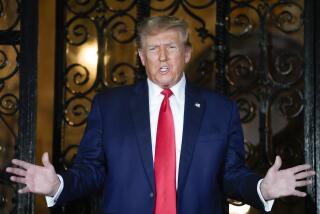Watching U.S. presidential vote, much of the world sees a less-strong America

In the eyes of much of the world, the United States is a potent yet faltering force, a conflicted nation heading into an election that will either redeem it or tug it farther away from the myths and promise that for generations defined it in capitals from Singapore to Paris and Buenos Aires to Nairobi.
The stature and standing of the U.S. have plummeted in recent years, a number of international polls suggest. That trend has been exacerbated this year by what is widely perceived to be a disorderly and ineffectual governmental response to the COVID-19 pandemic, and now by a chaotic electoral process.
For some, a once-bright beacon of egalitarian values has faded into an aloof, disfigured power.
“The United States was always a model to follow,” said Gloria Jácome Torres, a 41-year-old lawyer in Mexico City. “Since I was a student, I always viewed the United States with admiration — everything they did there with respect to human rights, the level of education, personal liberties.”
But particularly during the last four years, her view has been soured by what she sees as a pattern of cruelty and callousness emanating from U.S. officialdom, as seen in the mistreatment of migrants and racial injustice laid bare.
“Honestly, I believe that the United States is not the same as before,” she said. “One sees the news and thinks, ‘Is this really what the United States has become?’”
In many parts of the world, a broad sense of disillusionment directed at the United States cannot be laid solely at the feet of President Trump, who began his term in January 2017. Particularly in regions such as Latin America and the Middle East, where the U.S. for decades propped up repressive regimes, historic grievances long predate Trump’s headlong America-first presidency.
Still, this year’s presidential campaign pitting Trump, a Republican, against former Vice President Joe Biden, a Democrat, marks something of a role reversal for a country long accustomed to calling on volatile or repressive states elsewhere in the world to hold free and fair elections. This time, the International Crisis Group, a nonprofit conflict-resolution organization, suggested Thursday that foreign leaders “urge respect for democratic norms” as Americans go to the polls.
Some veteran observers of U.S. society say the current climate of political divisiveness brings a sense of deja vu — and a reminder that upheaval and discontent are nothing new, even in a country that has prided itself on the strength of its democratic institutions.
Bilahari Kausikan, a former Singaporean ambassador to the United Nations, said the fevered atmosphere surrounding the U.S. election Nov. 3 reminded him of the 1970s, when he lived in the United States and saw firsthand a superpower racked by turmoil and questioning its direction.
“That, to me, is a period of self-doubt that was perhaps even worse, because you were defeated in war in Vietnam, the economy was in shambles, even worse than it is now. The racial polarization was always there,” he said. “And it’s not just America — all Western democracies go through periodic paroxysms of self-doubt. But people should not underestimate your ability to regenerate yourself.”
Nevertheless, in places such as Germany — where, within living memory, the United States served as a much-admired protector — angst over the mercurial American path in recent years has become palpable. Germany, which is Europe’s biggest economy, is one of the United States’ closest traditional allies, but the relationship has been severely strained by Trump’s angry outbursts over the defense spending and trade policies of Chancellor Angela Merkel’s government.
Olav Schrage, 48, a cardiologist in Berlin who has often visited the United States, said many of his compatriots view Trump as a “total fraud” and an “appalling person.” But what truly worried him, he said, was that “so many [Americans] are OK with that, and not only accept that, but also applaud it.”
For many Germans, the sense of connection to America and Americans is deeply personal. Schrage, like others of his generation, has childhood memories of the Cold War, when nearly a quarter-million U.S. troops were stationed in then-West Germany as a bulwark against a looming threat from the Soviet Union, which controlled what was then East Germany.
An older generation of Germans recalls how the U.S.-funded Marshall Plan helped its erstwhile enemy rebuild from the ashes of World War II, paving a path to prosperity. And in 1948-49, the American-led Berlin airlift was a vital lifeline for a besieged city, with planes touching down around the clock, defying the Soviet blockade of West Berlin.
In East Asia, other historic allies are feeling puzzled and wary over U.S. stumbles.
South Korea has been largely successful in containing a coronavirus outbreak that began almost exactly the same time as the one in the United States. Its population is less than one-sixth of that of the U.S., but it has had about 450 deaths from COVID-19, compared with more than 222,000 in the United States.
Hong Ju-min, a South Korean pastor who runs a shelter for refugees in Seoul’s Suwon suburb, received a call this month about a curious asylum seeker no one knew quite what to do with — an American.
The Texas-born Black man in his 40s, who’d arrived in the country in February from Indiana, said that he was persecuted back home because of his race and that his native country was in turmoil, Hong said.
“I’d never seen anything like it — I wondered, what’s going on?” said Hong, who typically works with refugees from Yemen, Angola or Egypt. “It seems America is really teetering.”
Like many South Koreans, the pastor has felt whipsawed by Trump’s on-again-off-again wooing of North Korean dictator Kim Jong Un.
“It’s like a child playing around, so unpredictable and not rational or reasonable,” he said. “The U.S. supposedly leads the world, but it’s unstable and impossible to tell what will happen.”
In rival China, tensions with Washington have flared this year over matters including the coronavirus — for whose worldwide spread Trump blames Beijing (China has reported fewer than 5,000 coronavirus deaths), China’s new national security law in Hong Kong, and human rights abuses in Xinjiang. The two countries this year shut each other’s consulates in Houston and Chengdu.
Among Chinese social-media users, the topic of U.S. elections has attracted more than 2.6 billion views on the microblogging site Weibo. There are avid discussions of presidential debates, Trump’s hospitalization for COVID-19, U.S. opinion polls and campaign finance.
Many commentators post an emoji of a person holding a slice of watermelon — a Chinese variant on the box-of-popcorn emoticon in the U.S., meant to signify watching something unfold with a sense of amused detachment.
American woes are a propaganda bonanza for China’s state media, which are flooded with reports of soaring U.S. coronavirus cases and deaths, alongside violent images of protesters clashing with police — all meant to suggest that U.S. democratic institutions, unlike China’s authoritarian system, are unable to ensure public safety and bring about an economic recovery.
For all of the still-enormous store of American “soft power” — its profound cultural and economic impact around the globe — the longtime U.S. role as a magnet for bright and ambitious young people the world over is fading in some quarters, said César Molina, 33, an engineer in the Venezuelan capital, Caracas.
“I think that people see the United States less and less as a place to emigrate to or study, because of the complex restrictions,” he said. “The barriers have made it so that we don’t consider emigration to the United States as an attractive option, compared to countries like Germany, Austria, Canada.”
Even if there has been a significant erosion of the U.S. image abroad, neither allies nor foes doubt the importance of the relationship going forward.
Peter Beyer, a German lawmaker and his government’s coordinator of transatlantic issues, said Europe considers a strong partnership with the United States as vital, no matter who is the next president.
“It’s sad to observe that things aren’t really going forward right now, and that it seems like there has been a destruction of transatlantic pillars,” said Beyer, who earned a law degree at the University of Virginia and practiced law in the United States. “That’s really frustrating.”
Kausikan, the Singaporean diplomat, said the United States is still a strong draw for young Asians seeking a higher education. But he said that these days, American traits like creativity were a greater inspiration than the country’s political system.
And as for setting a democratic example, he had some blunt advice for the United States.
“Don’t idealize yourself,” Kausikan said. “Because others don’t.”
Times staff writers King and Bengali reported from Washington and Singapore, respectively, and special correspondent Kirschbaum from Berlin. Staff writers Patrick J. McDonnell in Mexico City, Alice Su in Beijing and Victoria Kim in Seoul and special correspondents Cecilia Sánchez in Mexico City, Mery Mogollón in Caracas and Andrés D’Alessandro in Buenos Aires contributed to this report.
More to Read
Start your day right
Sign up for Essential California for news, features and recommendations from the L.A. Times and beyond in your inbox six days a week.
You may occasionally receive promotional content from the Los Angeles Times.







